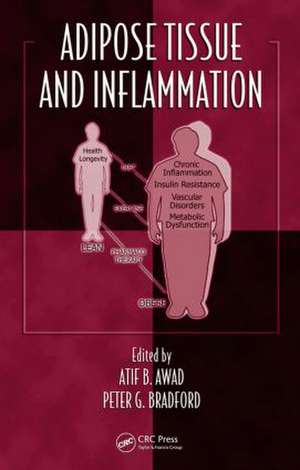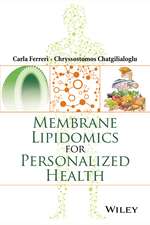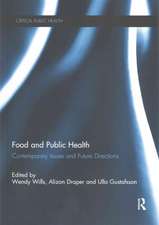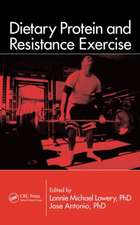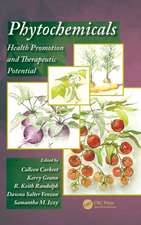Adipose Tissue and Inflammation: Oxidative Stress and Disease
Editat de Atif B. Awad, Peter G. Bradforden Limba Engleză Hardback – 8 oct 2009
Bringing together the research and findings of leading experts from across the world, Adipose Tissue and Inflammation focuses on the contribution of adipose tissue to local and systemic inflammation. Demonstrating the endocrine like nature of adipose tissue, this book—
- Looks at the direct relation between adipokines and inflammation
- Examines the role of adipose secreted hormones as mediators of inflammation
- Details the inflammatory actions of adiponectin, leptin, and resistin
- Discusses insulin and dietary fatty acids as modulators of inflammation
Din seria Oxidative Stress and Disease
-
 Preț: 356.63 lei
Preț: 356.63 lei -
 Preț: 379.23 lei
Preț: 379.23 lei - 11%
 Preț: 319.88 lei
Preț: 319.88 lei - 15%
 Preț: 556.99 lei
Preț: 556.99 lei - 25%
 Preț: 410.54 lei
Preț: 410.54 lei - 12%
 Preț: 316.54 lei
Preț: 316.54 lei - 29%
 Preț: 1188.26 lei
Preț: 1188.26 lei -
 Preț: 436.95 lei
Preț: 436.95 lei - 18%
 Preț: 785.60 lei
Preț: 785.60 lei -
 Preț: 447.52 lei
Preț: 447.52 lei -
 Preț: 441.97 lei
Preț: 441.97 lei -
 Preț: 437.13 lei
Preț: 437.13 lei -
 Preț: 356.60 lei
Preț: 356.60 lei - 33%
 Preț: 712.64 lei
Preț: 712.64 lei - 18%
 Preț: 1119.30 lei
Preț: 1119.30 lei - 18%
 Preț: 1343.11 lei
Preț: 1343.11 lei - 5%
 Preț: 603.59 lei
Preț: 603.59 lei - 18%
 Preț: 1340.43 lei
Preț: 1340.43 lei - 18%
 Preț: 1349.89 lei
Preț: 1349.89 lei - 18%
 Preț: 2235.06 lei
Preț: 2235.06 lei - 18%
 Preț: 1000.27 lei
Preț: 1000.27 lei - 15%
 Preț: 470.32 lei
Preț: 470.32 lei -
 Preț: 458.67 lei
Preț: 458.67 lei - 10%
 Preț: 317.80 lei
Preț: 317.80 lei - 5%
 Preț: 1038.51 lei
Preț: 1038.51 lei - 5%
 Preț: 1290.50 lei
Preț: 1290.50 lei -
 Preț: 431.18 lei
Preț: 431.18 lei - 18%
 Preț: 1866.69 lei
Preț: 1866.69 lei - 26%
 Preț: 1414.22 lei
Preț: 1414.22 lei - 28%
 Preț: 1525.52 lei
Preț: 1525.52 lei - 29%
 Preț: 1407.70 lei
Preț: 1407.70 lei - 26%
 Preț: 1299.29 lei
Preț: 1299.29 lei - 28%
 Preț: 1576.34 lei
Preț: 1576.34 lei - 26%
 Preț: 1351.70 lei
Preț: 1351.70 lei - 28%
 Preț: 1415.04 lei
Preț: 1415.04 lei - 21%
 Preț: 1497.55 lei
Preț: 1497.55 lei - 25%
 Preț: 1052.93 lei
Preț: 1052.93 lei
Preț: 1330.94 lei
Preț vechi: 1623.09 lei
-18% Nou
Puncte Express: 1996
Preț estimativ în valută:
254.67€ • 265.90$ • 210.78£
254.67€ • 265.90$ • 210.78£
Carte tipărită la comandă
Livrare economică 04-18 aprilie
Preluare comenzi: 021 569.72.76
Specificații
ISBN-13: 9781420091304
ISBN-10: 1420091301
Pagini: 318
Ilustrații: 26 b/w images, 18 tables and PPI 606
Dimensiuni: 156 x 234 x 20 mm
Greutate: 0.57 kg
Ediția:1
Editura: CRC Press
Colecția CRC Press
Seria Oxidative Stress and Disease
ISBN-10: 1420091301
Pagini: 318
Ilustrații: 26 b/w images, 18 tables and PPI 606
Dimensiuni: 156 x 234 x 20 mm
Greutate: 0.57 kg
Ediția:1
Editura: CRC Press
Colecția CRC Press
Seria Oxidative Stress and Disease
Public țintă
Academic, Professional, and Professional ReferenceCuprins
The Adipose Organ. Adipose Tissue as Endocrine Organ. Epidemiology of Obesity. Inflammatory and Anti-Inflammatory Mediators Secreted by Adipose Tissue. Adipokines and Inflammation. Insulin as Modulator of Adipose Inflammation. Growth Hormone as Modulator of Adipose Inflammation. Glucocorticoids as Modulators of Adipose Inflammation. Prostaglandins as Mediators of Adipose Inflammation. Inflammatory Actions of Adiponectin, Leptin, and Resistin. Dietary Fatty Acids as Modulators of Adipose Inflammation. Anti-Inflammatory Properties of Plant Sterols and Phytoestrogens: Experimental and Clinical Evidence. Antioxidants, Polyphenols, and Adipose Inflammation. Role of Exercise and Weight Loss in Reducing Inflammation. Adipose Tissue and Anti-Inflammatory Pharmacotherapy. Conclusions and Future Directions.
Notă biografică
Atif B. Awad is an associate professor of nutrition at the State University of New York at Buffalo. He earned his PhD in nutrition from Rutgers University, New Brunswick, New Jersey, and completed postdoctoral training in biochemistry at the University of Iowa. He has supervised more than 80 MS and PhD students. He has published more than 80 papers and presented more than 70 abstracts at national and international scientific meetings. His research focus is in the area of dietary lipids and their effects on disease prevention, particularly the effects of phytochemicals on combating chronic diseases.
Peter G. Bradford is an associate professor of pharmacology and toxicology at the State University of New York at Buffalo. Dr. Bradford earned a BS summa cum laude in biology from the State University of New York at Albany and a PhD in biochemistry from the University of Rochester. He is author or coauthor of more than 50 research journal articles and book chapters and has served as an invited speaker for more than 50 university lectures, international scientific presentations, and various television and radio interviews. His work on hormone therapeutics has been cited by the New York Times, Women’s World Magazine, and various pharmacology weblogs. He is a member of the ADA Council on Scientific Affairs and the ADA National Board Test Construction Committee. He is a long-standing member of the Endocrine Society.
Peter G. Bradford is an associate professor of pharmacology and toxicology at the State University of New York at Buffalo. Dr. Bradford earned a BS summa cum laude in biology from the State University of New York at Albany and a PhD in biochemistry from the University of Rochester. He is author or coauthor of more than 50 research journal articles and book chapters and has served as an invited speaker for more than 50 university lectures, international scientific presentations, and various television and radio interviews. His work on hormone therapeutics has been cited by the New York Times, Women’s World Magazine, and various pharmacology weblogs. He is a member of the ADA Council on Scientific Affairs and the ADA National Board Test Construction Committee. He is a long-standing member of the Endocrine Society.
Descriere
Obesity leads to a host of pathologies, including cardiovascular disease, insulin resistance, and metabolic syndrome. Central to all of these pathologies is the concept that obesity produces chronic inflammation. Featuring contributions from international experts in the fields of adiposity, inflammation, adipokines, and pharmaconutrition, this book focuses on the effects of obesity on systemic inflammation. The text addresses the epidemiology of obesity-induced inflammation, the adipokine mediators that link adipose tissue to inflammation, the influence of hormones on adipose inflammation, and the roles of nutrients, lifestyles, and pharmacotherapy in reducing inflammation and obesity.
